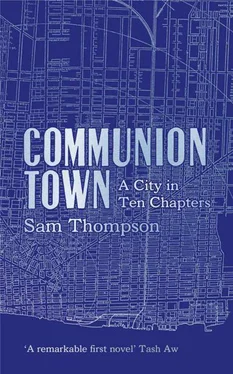‘What we do know,’ the inspector said, ‘is that Brutus Thorne was last seen alive in Shambles Heath, in the vicinity of Meaney’s. That’s one of the low drinking dens he was known to frequent, Ms Byrd.’
I had picked up several useful leads in Meaney’s myself, in the past, but I just smiled.
‘Witnesses confirm that when Thorne left this establishment he was deep in conversation with an unidentified companion, and that both individuals were seen to proceed in the direction of the Shambles Heath metropolitan tram station.’
That had been the last sighting of Brutus Thorne alive, the inspector told us. But there was no lack of testimony about what followed. The reports formed a long curving trail across the city, southwards from Shambles Heath through Serelight and into Glory Part, then across the Part bridge, up through Lawntown and Communion Town into the Esplanade: all the way along the line of the metro that this tram had travelled tonight.
At Shambles Heath station a person or persons unknown had lured Brutus Thorne into proximity with a particular tramcar. He would have had no time to offer resistance as a pair of self-locking cuffs were slapped around his ankles. The assault had been diligently prepared. Six-foot lengths of steel chain ran from the cuffs to the rear of the tram, where they had been attached in advance. The timing was precise. It was all too easy to imagine: as Thorne realises his predicament, he grabs for his assailant, tussles and perhaps lands a blow or two, but the villain struggles free and melts away, work done. Before the detective can call out, the tram begins to move and his feet are wrenched from under him. He scrabbles on the tarmac to regain his footing, but as the vehicle accelerates he is dragged along behind it, like … like …
The inspector stopped, lost for words.
‘Like the fallen Hector,’ suggested Peregrine.
‘Like Hippolytus behind his chariot,’ I offered.
‘Like a sack of bloody potatoes,’ said the inspector. ‘Those things get up to fifty miles an hour, apparently, and it hauled him halfway round the city before winding up here. I don’t want to think about that. We’ve got the driver over there: says he saw nothing and heard nothing. Had his paper spread out on the control panel all the way from Shambles to the Palace, and he wants to know how much compensation he’s due for the distress. But I’m not bothered about him. It’s this anonymous companion from Meaney’s I want — and I can guess who you’re going to tell me it was.’
Peregrine was kneeling close to the tram, touching the metal lumps where the chains had been welded to the undercarriage.
‘Yes, inspector, no doubt you can,’ he said as he got up. ‘But the question, as always, is why . Why would Lazarus Glass choose this end, of all ends, for Brutus Thorne?’
I looked at the tram, still lit yellow in the failing darkness. It was newer and sleeker than the ungainly, graffiti-covered carriages which clattered around most lines of the metro.
‘One thought occurs,’ I said. ‘The metro route that the inspector has described, the curve that links Shambles Heath with the Old Quarter, terminating here at the Palace, is the most recently built line in the city. But, if I remember accurately, this is not the first time that it has been associated with criminal activity.’
‘Correct and to the point, Cassandra,’ said Peregrine. ‘Once more we must unearth the past to make sense of the fate that has befallen our comrades tonight — and now I must tell you about the last time I encountered Lazarus Glass face to face.
‘Six years ago,’ he continued, ‘the planned construction of the new metropolitan tramline had just been announced. Several organisations were in competition for the lucrative right to build it, and after negotiations the contract was awarded to an obscure group called the Lys Consortium. However, there were grounds to suspect that it had defeated its competitors through bribery, intimidation and violence, and soon Brutus and I found ourselves in a familiar contest, each of us working separately to uncover this wrongdoing.
‘It did not take me long to establish that the Consortium was a front, and that somewhere behind it stood Lazarus Glass. But it was less easy to gather enough evidence to expose the misdeeds which had won the contract, and I set to work, spurred by the knowledge that Brutus would be doing all that he could, in his own way, to get there first. There was scant hope of demonstrating the complicity of Lazarus, who was as hedged and invulnerable as he always is in his schemes; but as I worked on the case I grew increasingly troubled by another question. The mystery, I felt, was not how Lazarus had won the corrupt contract, but why he should wish to do so. Certainly there was crude profit in it, but less than he might have gained through a thousand other illicit enterprises. No: I realised, as I analysed his plot, that the metro line held some other significance for him.
‘It was at this point that I received an unexpected visitor in my consulting rooms.
‘In person, of course, Lazarus Glass does not look like a devil. The air did not boil as he entered the room and the mirror did not crack. He looked underfed, or unconcerned with his body’s needs. Since our student days he had lost his hair and grown a full beard, giving him a sober Aeschylean appearance. He wore a dark suit and tie. The only other change was in his eyes, which were as piercing as ever, but now there was a strange duality in his gaze: even as he studied me, he gave an impression of blindness, as if what he saw was not what lay in front of him.
‘“Peregrine,” he said. “You will forgive my calling on you without prior arrangement, under the circumstances. We need not waste time discussing all that has taken place since we last met in person — not when we have been continually in conversation through the medium of the city itself.”
‘“The medium of your crimes,” I said sadly. “I wish it might have been otherwise, Lazarus.”
‘An expression of scorn crossed his face.
‘“It will convenience you to know,” he said, “that you may abandon your investigations into the matter of the Lys Consortium and the new metropolitan line. The thuggery of your associate Brutus Thorne has prevailed over your methodological elegancy, and he has beaten you to the proof. The Consortium will now fail, a scandal will ensue, and in due course another company instead will profit from the construction of the new line, while my name will, naturally, at no stage be mentioned in connection with the affair. At the proper time I will requite Thorne amply for the damage he has inflicted on my interests. Your own efforts in this case, meanwhile, have been wasted.”
‘“Not entirely wasted, Lazarus,” I said. I thought I knew the true reason for his visit. “I have learned a good deal about you.”
‘“I am aware of what you have … surmised,” he said, and for the first time he seemed amused. “I will allow that you have understood far more about my endeavours than any other detective — and although it will not help you, I am not unimpressed.”
‘“You are a puzzle, old friend,” I said.
‘This was the question that had nagged at me of late: why, all those years ago, when he stood on the threshold of a dazzling career in detection after graduating with a double first in Ratiocination and Criminology, had Lazarus turned aside and vanished into the city’s underworld to become the inversion of all he had worked for? Perhaps the worm had always been there, curled in the bud of his brilliance. Perhaps he had concluded that he would never prevail in his rivalry with me, and, rather than accept second place, preferred the role of nemesis. But perhaps, too, I now suspected, his fall was connected with the Art of Memory.
Читать дальше
Конец ознакомительного отрывка
Купить книгу












